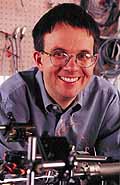|
This is an archived article.
For the latest news, go to the Advance
Homepage
For more archives, go to the Advance Archive/Search Page. |
||
|
Physics Nobelist To Speak
About 'Stone Cold Science'
Cornell, from the National Institute of Standards and Technology (NIST) and the Joint Institute for Laboratory Astrophysics (JILA) in Boulder, Colorado, shared the award with his colleague at JILA, Carl Wieman, and Wolfgang Ketterle from MIT "for the achievement of Bose-Einstein condensation in dilute gases of alkali atoms, and for early fundamental studies of the properties of the condensates." This work will be the subject of Cornell's lecture: "Stone Cold Science: BEC and the Weird World of Physics a Millionth of a Degree from Absolute Zero." Atoms are known to possess wave-like properties, but they display them reluctantly. In the 1920s, Einstein extended Bose's work on photons to atoms, predicting that at sufficiently low temperatures, certain atoms would condense into the lowest possible energy state. The resulting state, a Bose-Einstein condensate (BEC), is represented by a coherent macroscopic wave function, where the atoms "sing together in unison."
The relationship of a BEC to a normal sample of atoms is similar to that between a laser and a light bulb. In 1995, this state of matter was clearly observed in a sample of 2000 rubidium atoms cooled to 20 nK above absolute zero by Cornell and Wieman and their colleagues at JILA. Since that time, the field has exploded, especially in the areas of atomic physics, condensed matter physics, and statistical mechanics. This year's Katzenstein Lecture is an opportunity to hear about Bose-Einstein condensation from one of its discoverers. Cornell will give his lecture at 4 p.m. on Friday, Nov. 15, in Room P36 of the Gant Science Complex. A reception will precede the lecture at 3 p.m. in Room P103. |

